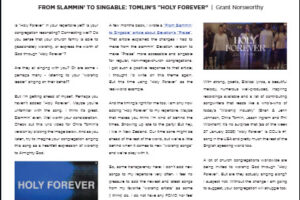Take this link to read Grant’s article as featured in the March issue of Worship…

SMALL MUSICAL SADNESSES
By Grant Norsworthy
Worshipping musicians! I believe that we must learn to accept several, small musical sadnesses. These will be necessary if we are to experience, what I call, the higher joy of music.
There are some small, yet significant, sacrifices that we – who are given the opportunity to lead our Church congregation to worship God through songs – will need to accept. If it truly is our goal and desire to lead the people – to help them find their own “voice” as they sing prayers, praises and reminders of Gospel truths together – we will need to make some selfless, congregation-serving, musical choices. Initially, we won’t like it.
We’ll need to make a clearer distinction between the choices we would make if, on the one hand we’re performing for an audience and, on the other hand we’re leading a congregation to sing as an expression of worship to God.
- SONG KEY: If we choose a key for a song with congregational sing-ability as the primary consideration, we will experience a certain amount of sadness. The song will probably feel less exciting to us. Vocalists especially will experience disappointment that the congregational key does not highlight their best register.
- VOCAL EMBELLISHMENT: Leading vocalists may feel a certain loss of personal joy as we resist the urge to sing songs in our individual performance style. Instead, we will present a straighter, simpler, guiding melody that the congregation will be more able to follow and sing with us.
- HARMONY VOCALS: Knowing that too much vocal harmony too often can turn a melody-singing congregation into a performance-listening audience, we will hold back, stick to the melody more often and use harmony vocals sparingly and only when we are sure the congregation is confident of the melody. It’ll sting, but just a little.
- DUAL MELODY: Knowing that something like half of our congregation is male and the other half female, and that they’ll all sing better if they hear the notes we’re asking them to sing, our default will be to present male and female leading, melody-only voices simultaneously. We’ll probably miss the joy of a solo voice. Another small sadness.
- GET OFF THE MIC: Leading vocalists will be looking for opportunities to move away from our microphones. When we sense that the congregation is singing well, we will realize that they don’t need the guidance of our amplified voices. As often as possible, we will allow the congregation’s “voice” to fill the room.
- SONG-SERVING DRUMS: Denying the urges of their inner stadium-rock star, drummers will refrain from playing those personally enjoyable drum fills that cut across the vocal melody. They’ll learn to play with solid timing, simple, more repetitive beats and with the necessary dynamic control. They’ll even play with hotrods or brushes if that’s what it takes! Did someone say djembe? Not as fun for the drummer perhaps, but a sadness that will need to be accepted.
- MELODY SUPPORTING INSTRUMENTATION: As the instrumentalists make musical choices that serve the vocal melody of each song above anything else, there may be some sadness. Playing more simply – never making sonic statements that over-complicate or cloud the vocal melody – will be more important than playing what and how we want. This may involve some sacrifice of personal, individual musical joy.
But the pay back! I have found that if we are willing to accept these small, necessary musical sadnesses, we are more than compensated. In fact, we can be lavishly rewarded. We will open the path ahead to a far greater joy from music. Namely, the privilege of being a musical servant who warmly invites our congregation to connect more deeply with God and with each other through songs. To hear the people sing – with heart-felt passion and volume – is a beautiful thing.
Do nothing from selfish ambition or conceit, but in humility count others more significant than yourselves. Let each of you look not only to his own interests, but also to the interests of others. – Philippians 2:3-4 (ESV)
Then Jesus told his disciples, “If anyone would come after me, let him deny himself and take up his cross and follow me.” – Matthew 16:24 (ESV)
Tellingly, the choices we make within the microcosm of music have undeniable parallels with core truths of being a disciple of Jesus the Christ.


